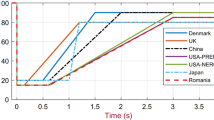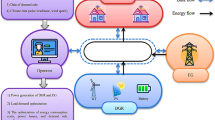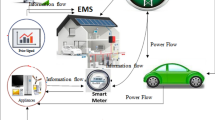Abstract
Extensive usage of electric vehicles (EVs) is very effective, through coordinated scheduling, to provide the solution for scarcity of energy, greenhouse emissions, environmental pollution, and in addition to achieve economic stability and energy security of any nation. India’s pledge of reduction in greenhouse gases emission by 45% till 2030 would catalyze the huge increment in the number of EVs. However, the increased load from the growing number of EVs will lead to the technical challenges in the existing distribution network such as deterioration of voltage profile and increased peak load due to unplanned EV charging stations. Since, the charging load of EVs is very uncertain in terms of amount of charging power, charging location, and charging time due to its movable nature. To address these potential issues, the smart EVs and smart power grid equipped with EV aggregators would help to assess the accurate charging demand at specific times in a day-cycle. This work examines the fundamental difficulties that arise because of EVs charging load to the network at various penetration levels. The simulation and analysis of the EV models by using random values of arrival and departure times, the SoC are used to calculate the charging load of EVs at random time of day-cycle by using Monte-Carlo approach. The EVs are scheduled to take measures to reduce peak and manage the flat load profiles in a coordinated manner based on the charging margin and charging urgency indices. Daily load data of India and IIT Kanpur campus are used for simulation and validation of proposed methodology. The study in this paper shows the result of coordinated scheduling. The load curve peak is shaved up to 7.0%.













Similar content being viewed by others
Abbreviations
- EVs:
-
Electric vehicles
- SoC:
-
State of charge
- IIT:
-
India Institute of Technology
- NDC:
-
Nationally determined contributions
- UNFCCC:
-
United Nations Framework Convention on Climate Change
- GDP:
-
Gross domestic product
- IEA:
-
International Energy Agency
- PEV:
-
Plug-in electric vehicles
- V2G:
-
Vehicle-to-grid
- G2V:
-
Grid to vehicles
- HEVs:
-
Hybrid electric vehicles
- EVCS:
-
Electric vehicle charging station
- ICE:
-
Internal combustion engine
- PKM:
-
Passenger-kilometre
- IPT:
-
Intermediate public transport IPT
- CAGR:
-
Compound annual growth rate
- FAME:
-
Faster adoption and manufacturing of EV
- NDC:
-
Nationally determined contributions
- IoT:
-
Internet of things
- BU:
-
Billion unit
- CMI:
-
Charging margin index
- CUI:
-
Charging urgency index
- FF-PC:
-
Flattening factor-partially coordinated
- FF-FC:
-
Flattening factor-fully coordinated
- FF-UC:
-
Flattening factor-un coordinated
References
https://pib.gov.in/PressReleasePage.aspx?PRID=1847813. Accessed 24 Dec 2022
https://www.planete-energies.com/en/media/article/electricity-generation-and-related-co2-emissions#:~:text=Electricity%20and%20Greenhouse%20Gases,gas%2Dfired%20power%20plants3. Accessed 07 Jun 23
https://www.istockphoto.com/vector/ecology-concept-and-environmental-banner-design-elements-for-sustainable-energy-gm1209219797-349831805. Accessed 25 Dec 2022
https://www.niti.gov.in/sites/default/files/2022-04/20220420_Battery_Swapping_Policy_Draft.pdf. Accessed 25 Dec 2022
IEA (2021) India Energy Outlook 2021. IEA, Paris. https://www.iea.org/reports/india-energy-outlook-2021, License: CC BY 4.0
Singh PP, Wen F, Palu I, Sachan S, Deb S (2022) Electric vehicles charging infrastructure demand and deployment: challenges and solutions. Energies 16(1):7
Shao S, Pipattanasomporn M, Rahman S (2011) Demand response as a load shaping tool in an intelligent grid with electric vehicles. IEEE Trans Smart Grid 2(4):624–631
Deb S, Tammi K, Kalita K, Mahanta P (2018) Impact of electric vehicle charging station load on distribution network. Energies 11(1):178
Singh SP, Singh PP, Singh SN, Tiwari P (2021) State of charge and health estimation of batteries for electric vehicles applications: key issues and challenges. Glob Energy Interconnect 4(2):145–157
Tulpule PJ, Marano V, Yurkovich S, Rizzoni G (2013) Economic and environmental impacts of a PV powered workplace parking garage charging station. Appl Energy 108:323–332
Jafari M, Gauchia A, Zhang K, Gauchia L (2015) Simulation and analysis of the effect of real-world driving styles in an EV battery performance and aging. IEEE Trans Transp Electrif 1(4):391–401
Sachan S, Deb S, Singh SN (2020) Different charging infrastructures along with smart charging strategies for electric vehicles. Sustain Cities Soc 60:102238
Habib S, Kamran M, Rashid U (2015) Impact analysis of vehicle-to-grid technology and charging strategies of electric vehicles on distribution networks–a review. J Power Sources 277:205–214
Hadley SW (2007) Evaluating the impact of plug-in hybrid electric vehicles on regional electricity supplies. In: 2007 iREP symposium-bulk power system dynamics and control-VII. Revitalizing operational reliability. IEEE, pp 1–12
Singh PP, Das S, Wen F, Palu I, Singh AK, Thakur P (2023) Multi-objective planning of electric vehicles charging in distribution system considering priority-based vehicle-to-grid scheduling. Swarm Evol Comput 2:101234
Salah F, Schuller A, Maurer M, Weinhardt C (2016) Pricing of demand flexibility: exploring the impact of electric vehicle customer diversity. In: 2016 13th international conference on the European energy market (EEM). IEEE, pp 1–5
Mohamed MA, Abdullah HM, El-Meligy MA, Sharaf M, Soliman AT, Hajjiah A (2021) A novel fuzzy cloud stochastic framework for energy management of renewable microgrids based on maximum deployment of electric vehicles. Int J Electr Power Energy Syst 129:106845
Wang P, Wang D, Zhu C, Yang Y, Abdullah HM, Mohamed MA (2020) Stochastic management of hybrid AC/DC microgrids considering electric vehicles charging demands. Energy Rep 6:1338–1352
Lan T, Jermsittiparsert K, Alrashood ST, Rezaei M, Al-Ghussain L, Mohamed MA (2021) An advanced machine learning based energy management of renewable microgrids considering hybrid electric vehicles’ charging demand. Energies 14(3):569
Alhasnawi BN, Jasim BH, Bureš V, Sedhom BE, Alhasnawi AN, Abbassi R, Alsemawai MR, Siano P, Guerrero JM (2023) A novel economic dispatch in the stand-alone system using improved butterfly optimization algorithm. Energy Strateg Rev 49:101135
Alhasnawi BN, Jasim BH, Sedhom BE, Guerrero JM (2023) A new communication platform for smart EMS using a mixed-integer-linear-programming. Energy Syst 31:1–8
Alhasnawi BN, Jasim BH, Jasim AM, Bureš V, Alhasnawi AN, Homod RZ, Alsemawai MR, Abbassi R, Sedhom BE (2023) A multi-objective improved cockroach swarm algorithm approach for apartment energy management systems. Information 14(10):521
Alhasnawi BN, Jasim BH, Siano P, Alhelou HH, Al-Hinai A (2022) A novel solution for day-ahead scheduling problems using the IoT-based bald eagle search optimization algorithm. Inventions 7(3):48
Hao Y, Yazdani A, Zarghami M (2019) Optimized and coordinated charging methods for electric vehicles cost. In: 2019 North American power symposium (NAPS). IEEE, pp 1–5
Zhou K, Cheng L, Wen L, Lu X, Ding T (2020) A coordinated charging scheduling method for electric vehicles considering different charging demands. Energy 213:118882
Zheng Y, Shang Y, Shao Z, Jian L (2018) A novel real-time scheduling strategy with near-linear complexity for integrating large-scale electric vehicles into smart grid. Appl Energy 217:1–3
Kapoor A, Sinha H (2020) View: India’s urbanisation challenges and the way forward. The Economic Times. https://economictimes.indiatimes.com/news/economy/policy/view-indias-urbanisation-challenges-and-the-way-forward/articleshow/79443872.cms
Anup S, Yang Z (2020) New two-wheeler vehicle fleet in India for fiscal year 2017–18. International Council for Clean Transport
https://morth.nic.in/sites/default/files/Annual-Report-2017-18.pdf. Accessed 31 Dec 22
Kamboj P, Malyan A, Kaur H, Jain H, Chaturvedi V (2022) India Transport Energy Outlook
https://www.india-briefing.com/news/electric-vehicle-industry-in-india-why-foreign-investors-should-pay-attention-21872.html/. Accessed 14 Feb 2023
https://www.businesstoday.in/latest/story/indias-ev-market-to-grow-by-90-to-touch-150-billion-by-2030-report-314116-2021-12-01. Accessed 14 Feb 2023
https://www.niti.gov.in/sites/default/files/202104/FullReport_Status_quo_analysis_of_various_segments_of_electric_mobility-compressed.pdf. Accessed 14 Feb 2023
Rashidizadeh-Kermani H, Najafi HR, Anvari-Moghaddam A, Guerrero JM (2018) Optimal decision-making strategy of an electric vehicle aggregator in short-term electricity markets. Energies 11(9):2413
https://powermin.gov.in/en/content/power-sector-glance-all-india. Accessed 31 Dec 2022
Santos A, McGuckin N, Nakamoto HY, Gray D, Liss S (2011) Summary of travel trends: 2009 national household travel survey. United States. Federal Highway Administration
Daily load curve of IIT Kanpur and All India Dataset. https://doi.org/10.17632/cz3c75brkm.1
Author information
Authors and Affiliations
Contributions
SPS contributed to the conceptualization, acquisition, investigation, analysis and interpretation of data, data curation formal analysis, methodology, software, and writing- original draft. PT contributed to supervision, writing–review and validation. SNS done resources, supervision, writing–review, editing and validation.
Corresponding author
Ethics declarations
Conflict of interest
There are no conflicts of interest in submitting this paper. All co-authors have seen and agreed with the contents of the manuscript. We do not have any commercial or associative interest that represents a conflict of interest in connection with the work submitted. We declare that this research article is a completely original work of its authors; it has not been published before and will not be sent to other publications until the journal’s editorial board decides not to accept it for publication.
Additional information
Publisher's Note
Springer Nature remains neutral with regard to jurisdictional claims in published maps and institutional affiliations.
Rights and permissions
Springer Nature or its licensor (e.g. a society or other partner) holds exclusive rights to this article under a publishing agreement with the author(s) or other rightsholder(s); author self-archiving of the accepted manuscript version of this article is solely governed by the terms of such publishing agreement and applicable law.
About this article
Cite this article
Singh, S.P., Tiwari, P. & Singh, S.N. A new methodology of peak energy demand reduction using coordinated real-time scheduling of EVs. Electr Eng (2024). https://doi.org/10.1007/s00202-024-02407-7
Received:
Accepted:
Published:
DOI: https://doi.org/10.1007/s00202-024-02407-7




